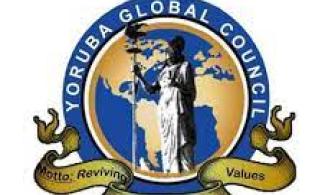
The group, however, appealed to peace-loving Nigerians to continue to advocate for peace ahead of the 2023 general elections and shun any action or behaviour that could trigger violence, conflict and disintegration of the country
The Yoruba Global Council (YGC), a Yoruba diaspora-based socio-cultural organisation has decried the spate of insecurity in Nigeria characterised by incessant killings across the country.
The group, however, appealed to peace-loving Nigerians to continue to advocate for peace ahead of the 2023 general elections and shun any action or behaviour that could trigger violence, conflict and disintegration of the country

YGC stated this in a statement made available to SaharaReporters, titled: "June 12 Anniversary: - Yoruba Global Council Decries Nationwide Killings, Calls For Peace Ahead Of 2023 General Polls," signed by its Spokesman and General Secretary, Prof. Lere Amusan and Prince Segun Akanni respectively.
It noted that as a socio-cultural group established to advance the course and interest of the Yoruba nation through the promotion of unity, mutual trust, trade liberalisation, co-existence and interactions with other ethnic nationalities in Nigeria and the Diaspora, it regretted the turn of events in the country.
According to the statement, "given the plethora of security challenges plaguing the polity, YGC observes this year’s June 12 anniversary amidst sober reflection, apprehension and sheer discontent”.
It said, "Today makes it twenty-nine years of that momentous event in which the popular will of the Nigerian people was brutally subverted by the military junta led by General Ibrahim Babangida. It would be vividly recalled that on June 12, 1993, the majority of the Nigerian electorate headed for their respective polling units to exercise their franchise in line with their conscience.
"Unlike what transpires today, hardly was any voter influenced or induced with money before exercising his or her civic duty on that historic day. The process led to the election of the Social Democratic Party (SDP) Presidential candidate, late Chief Moshood Kashimawo Olawale Abiola (popularly known as MKO).
"The emergence of MKO as the winner of that election widely adjudged as the freest, fairest and most credible poll ever conducted in the political history of Nigeria signalled hope and prospect for many Nigerians whose lives had been enmeshed in abject poverty, unemployment and illiteracy orchestrated by the prolonged military hegemony.
"But to the dismay and utter chagrin of many discerning Nigerians and even international observers, the election was annulled."
Recounting the event of June 12, 1993, and all the attended consequences, they noted that democratic governance is characterised by a well-defined constitution drafted and adopted by the people, rule of law, independent judiciary, free press, social justice, inclusiveness, fundamental human rights, robust civil society and security of lives and property.
"These canons of democracy are essential if any meaningful development or dividends of democracy are expected at the doorsteps of the citizens," it said but expressed reservation that these things are observed in the breach.
The statement partly read, "Democracy, all over the world, especially in leading democratic milieus, is operationally synonymous with socio-economic growth, progress and development. Abraham Lincoln could not have made a mistake when he defined democracy as a government of the people, by the people and for the people.
"It is basically a system hinged on people-orientedness, people-centeredness and cannot functionally succeed without the participation of the masses (electorate). The practice of civil rule or democracy is precipitated on the anticipation of development in all ramifications."
It added, "Interestingly, Nigeria has recorded for the first time in its chequered history the existence of democratic dispensation for over two decades uninterrupted but are the canons of democracy existent in Nigeria’s context?”
It further noted, "All available development indices present a gloomy picture for the present and even the future. Today, the country is confronted with a myriad of challenges ranging from abject poverty, unemployment, high-level illiteracy to corruption, insecurity, injustice and impunity in every stratum of our national life.
"Many Nigerians live below the poverty line as many families can seldom feed their dependents three square meals a day. The economic woes of impoverished Nigerians are further exacerbated by disturbing news both in the national newspapers and social media of ‘first-class corruption’ perpetrated by members of the political class, killings and kidnapping by Boko Haram insurgents and other criminal elements, especially in the northern fringes of the country."
It, however, questioned how a government official could embezzle funds meant for development to the tune of N80 billion referring to the suspended Accountant-General of the Federation, Ahmed Idris’ case, while many Nigerians were complaining of hunger, joblessness, and insecurity.
"It is simply crazy and appalling," it said.
On the recent killings across the country, especially the terrorist attack last Sunday at St Francis Catholic Church Owa-Iuwa Owo in Ondo state, and the killing of Deborah Samuel and likes for alleged blasphemy, the group condemned the massacres and urged the government to take action.
"YGC, in alliance with the spirit of true democracy as canvassed by the symbol of June 12, Chief MKO Abiola, urges the Buhari-led administration to ensure that the will of the Nigerian electorate is upheld and their votes counted during the upcoming general elections across the board.